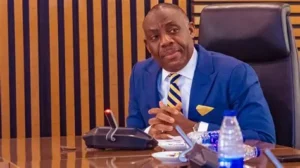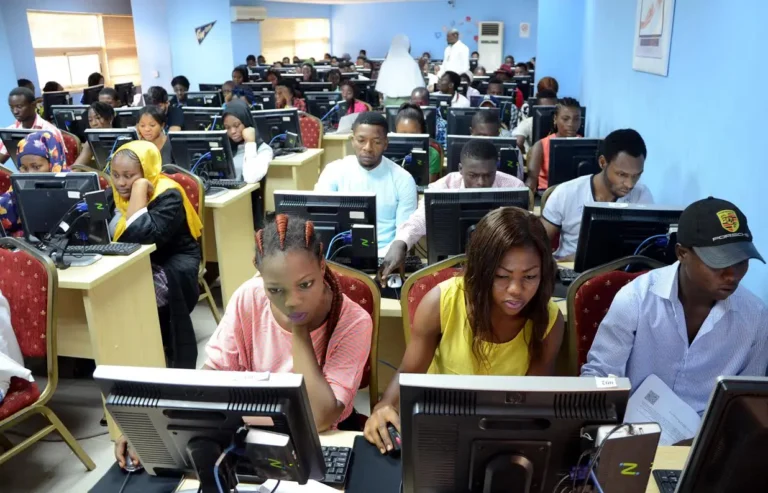In response to what it described as outdated and overly stringent entry requirements into the nation’s tertiary institutions, including universities, polytechnics, and colleges of education, the Nigerian government released a new policy on Tuesday that lowers the admission requirements for tertiary institutions.
According to a statement issued by the Federal Ministry of Education (FME), signed by its Director of Press, Folasade Boriowo, the new policy aims to increase access to tertiary education for more admission seekers than the nation’s institutions currently accommodate.
However, this is coming at a time when the Academic Staff Union of Universities (ASUU), body of lecturers in Nigerian universities, has embarked on a two-week warning strike over poor salaries, overstretched facilities, poor student-lecturer ratio, dearth of infrastructure, among other factors.

Justification for new policy
According to the statement, the Education Minister, Tunji Alausa, a medical doctor, is disatisfied with the existing policy, which he noted fails to recognise fairness and creates room for imbalance.
The statement reads in part: “Dr. Alausa explains that the reform has become necessary after years of restricted access that left many qualified candidates unable to secure admission. Every year, over two million candidates sit the Unified Tertiary Matriculation Examination (UTME), yet only about 700,000 gain admission. This imbalance, he notes, is not due to a lack of ability but rather to outdated and overly stringent entry requirements that must give way to fairness and opportunity.
“The revised National Guidelines for Entry Requirements into Nigerian Tertiary Institutions are designed to remove barriers while maintaining academic standards. The new framework applies to universities, polytechnics, colleges of education, and Innovation Enterprise Academies (IEAs) across the country as follows…”
New Requirements
According to the government, studying certain courses in universities, polytechnics, colleges of education, and innovation enterprise academies now only require a credit pass at o’level in either English Language or Mathematics.
The government has also made it a national policy that institutions must accept SSCE results from two sittings.
The current policy makes makes obtaining credit in both English and Mathematics at o’level mandatory for admission seekers, and this, according to Mr Alausa, is found to be constituting barriers for those seeking admission into tertiary institutions in the country.
The new requirements are contained in this statement by the ministry below;
FEDERAL MINISTRY OF EDUCATION
PRESS RELEASE
13th October, 2025
RENEWED HOPE IN ACTION: FEDERAL GOVERNMENT STREAMLINES ADMISSION REQUIREMENTS TO EXPAND ACCESS TO TERTIARY EDUCATION
The Federal Government, under the leadership of President Bola Ahmed Tinubu, GCFR, is taking decisive action to democratize access to tertiary education and empower Nigerian youths. A comprehensive reform of admission entry requirements into all tertiary institutions across the country has been approved. The policy, driven by the Honourable Minister of Education, Dr. Maruf Tunji Alausa, CON, represents a bold step in advancing the Renewed Hope Agenda and promoting inclusive education for national development.
Dr. Alausa explains that the reform has become necessary after years of restricted access that left many qualified candidates unable to secure admission. Every year, over two million candidates sit for the Unified Tertiary Matriculation Examination (UTME), yet only about 700,000 gain admission. This imbalance, he notes, is not due to a lack of ability but rather to outdated and overly stringent entry requirements that must give way to fairness and opportunity.
The revised National Guidelines for Entry Requirements into Nigerian Tertiary Institutions are designed to remove barriers while maintaining academic standards. The new framework applies to universities, polytechnics, colleges of education, and Innovation Enterprise Academies (IEAs) across the country as follows:
Universities: Minimum of five (5) credit passes in relevant subjects, including English Language, obtained in not more than two sittings. Mathematics is mandatory for Science, Technology, and Social Science courses.
Polytechnics (ND Level): Minimum of four (4) credit passes in relevant subjects, including English Language for non-science courses and Mathematics for science-related programs.
Polytechnics (HND Level): Minimum of five (5) credit passes in relevant subjects, including English Language and Mathematics.
Colleges of Education (NCE Level): Minimum of four (4) credit passes in relevant subjects, with English Language mandatory for Arts and Social Science courses, and Mathematics required for Science, Vocational, and Technical programmes.
Colleges of Education (B.Ed Level): Minimum of five (5) credit passes, including English Language and Mathematics, as applicable to the course of study.
Innovation Enterprise Academies (IEAs): To adopt the same minimum requirements as Polytechnics for the National Diploma (ND) program. The National Innovation Diploma (NID) is hereby abolished.
In addition, the National Industrial Diploma (NID) previously issued by Innovation Enterprise Academies will be phased out and replaced with the National Diploma (ND) to ensure uniformity, credibility, and progression opportunities for graduates. The National Board for Technical Education (NBTE) is currently re-accrediting all IEAs nationwide to align with the new ND standards. Institutions that fail to transition to full accreditation will be de-accredited.
The reform is a deliberate effort to expand access to tertiary education, creating opportunities for additional 250,000 to 300,000 additional students to be admitted to our Tertiary Institutions each year. It reflects a firm commitment to ensuring that every Nigerian youth has a fair chance to learn, grow, and succeed, putting the Renewed Hope Agenda into action.
The Minister adds that harmonizing admission guidelines will help reduce the number of out-of-school youths, strengthen vocational and technical training, and align Nigeria’s tertiary education structure with global and industry standards. He reiterates that young people remain the heartbeat of the nation, and the government is committed to equipping them with the education and skills they need to reach their full potential and contribute meaningfully to national development.
The Federal Government remains steadfast in its commitment to inclusive education, human capital development, and youth empowerment in line with the Renewed Hope Agenda of President Bola Ahmed Tinubu.
Attached: National Guidelines for Entry Requirements into Tertiary Institutions in Nigeria
Boriowo Folasade
Director, Press and Public Relations

